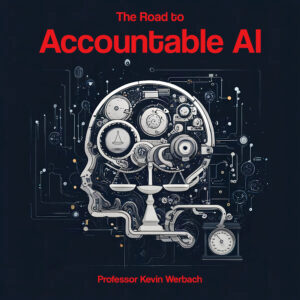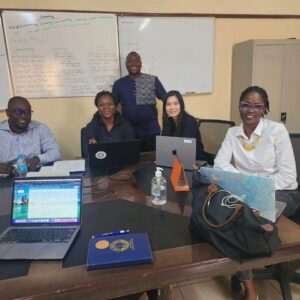Harnessing the Power of AI for Good
AI in Education: Leveraging ChatGPT for Teaching
Working alongside Ethan and Lilach Mollick, teachers at all levels will be empowered with the knowledge and skills to effectively incorporate AI into their classrooms. As AI becomes increasingly prevalent, understanding its capabilities, benefits, and potential pitfalls is crucial for modern educators.
This short course demystifies AI, focusing on tools like ChatGPT, and provides practical guidance on how to use these technologies to enhance teaching and learning experiences.

The Road to Accountable AI
Unlock the transformative potential of artificial intelligence with Wharton Professor Kevin Werbach. Join him as he delves into insightful interviews with leading experts and executives who are pioneering accountable AI systems in today’s world. Gain unparalleled insights into how AI is being implemented responsibly and ethically across industries.

Generative AI & Your Teaching: Center for Excellence in Teaching, Learning, and Innovation
The evolution of generative artificial intelligence, or AI, raises questions about how we ask students to think, what skills they will need, and which assignments and course policies can best support your teaching.

Center for Excellence in Teaching, Learning, and Innovation (CETLI) Teaching Seminars
CETLI Seminars are faculty groups that meet monthly through the academic year to explore particular teaching approaches and questions. Seminar discussions offer faculty the chance to explore topics by learning from a combination of colleagues’ experiences and research on evidence-based teaching practices.

Using Machine Learning to Distribute Aid in Sierra Leone
Angel Chung, a Wharton PhD student, uses decision-aware machine learning to optimize health supply chains in Sierra Leone. Her work addresses challenges in medicine distribution by improving efficiency and equity, utilizing alternative data sources and engaging with local stakeholders. Her approach has improved access to essential medicines by 20% in 2023.

Funded Projects
The Data Science and Business Analytics Fund supports new opportunities to expand the impact of AI and analytics. Drawing on Wharton faculty’s diverse research excellence, these projects transform opportunities using unprecedented volumes of digital, numerical, and text-based data.
Artificial Moral Agents
Amy Sepinwall, Associate Professor of Legal Studies and Business Ethics
This project seeks to gain clarity on whether AI can satisfy the requirements of moral agency and how this impacts corporations.
Building a Nudge Map: A Use Case of Research Cartography to Evolve Social Science
Duncan Watts, Stevens University Professor of Computer and Information Science, Communication, and Operations, Information and Decisions
Linnea Gandhi, Doctoral Candidate, OID
This project seeks to build a map of “nudge” or “choice architecture” interventions, enabling practitioners and academics alike to navigate the theoretical space easily and effectively. The map will be seeded with historical studies and enriched with data from new lab and field experiments to help validate what we, as a field, do and don’t yet “know” about the efficacy of these interventions across contexts.
Data Analytics for Economic Efficiency in Energy Policy
Susanna Berkouwer, Assistant Professor of Business, Economics and Public Policy
Arthur van Benthem, Associate Professor of Business, Economics and Public Policy
This project builds a research portfolio that gathers large data sets from the U.S. and across the world and uses sophisticated econometric tools to analyze this data with the goal of quantifying the inefficiency and unintended consequences from inefficient regulations, and to propose improved energy policy.
The Drivers of Immigrant Hiring
Saerom (Ronnie) Lee, Assistant Professor of Management
Exequiel (Zeke) Hernandez, Associate Professor of Management
Using multiple large-scale datasets on the U.S. labor market, this project will examine the firm-level drivers of hiring immigrant workers.
The Effect of Workplace and Economic Stress on Health Outcomes
Marius Guenzel, Assistant Professor of Finance
The goal of this project is to empirically study the effect of workplace and economic stress on health outcomes including aging and mortality.
Wharton Undergraduate Capstone Course: Federal and State Management of the Pandemic
Robert P. Inman, Richard King Mellon Professor Emeritus of Finance; Professor Emeritus of Business Economics & Public Policy
This project uses data collection for a student-led evaluation of the health and economic consequences of the Covid-19 pandemic and the effectiveness of national and state-wide policy responses to contain the coronavirus and to mitigate its health and economic consequences. The format for this evaluation will be a Capstone Course (BEPP 401) entitled, Federal and State Management of the Pandemic: Money, Messages, Vaccinations, and State Policies.
Measuring the Narratives of the COVID-19 Pandemic
Duncan Watts, Stevens University Professor of Computer and Information Science, Communication, and Operations, Information and Decisions
Baird Howland, PhD Student, Annenberg School of Communication, Computational Social Science Lab at Penn,
Valery Yakubovich, Executive Director, Computational Social Science Lab at Penn
The goal of this project is to study our understanding of the COVID-19 pandemic – the remarkably varied conceptions of what is happening, why it is happening, and what should be done in response, with a rare combination of quantitative rigor and qualitative depth.
Unmasking Sex Trafficking Supply Chains with Machine Learning
Hamsa Bastani, Assistant Professor of Operations, Information, and Decisions
Pia Ramchandani, Doctoral Candidate of Operations, Information, and Decisions
In collaboration with the Tellfinder Alliance for Global Counter-Human Trafficking, this project will leverage unstructured, massive deep web data from leading adult-services websites using a novel machine learning framework to construct the first global network view of sex trafficking supply chains.
Wharton Forensic Analytics Lab Data Case Series
Dan Taylor, Associate Professor of Accounting
This five-part case series will highlight recent accounting frauds (e.g., Wirecard, Luckin Coffee, etc.) and how each of the frauds could have been detected using business analytics.
Applied Neuroscience and Business Analytics Summer Undergraduate Internships for Underrepresented Students
Michael Platt, James S. Riepe University Professor of Marketing, Neuroscience, and Psychology; Faculty Director, Wharton Neuroscience Initiative
Elizabeth Johnson, Executive Director, Wharton Neuroscience Initiative
Wharton Neuroscience Initiative will support two underrepresented undergraduate summer students focused specifically on Applied Neuroscience and Business Analytics for a 10-week summer internship program. These students will be part of a new, larger applied brain and cognitive science summer undergraduate internship program which aims to combat systemic inequalities and a lack of diversity that plague neuroscience, brain and behavioral science, analytics, and data science careers.
Transparency in Police Misconduct Investigations
Dean Knox, Assistant Professor of Operations, Information, and Decisions
Rachel Mariman, Senior Research Project Manager, Analytics at Wharton
Using unique access to archives of administrative records on civilian complaints against police, this experimental study seeks to assess how city residents in Philadelphia, New York, and Chicago understand and perceive the current civilian complaint process, and systematically evaluates the impact of transparency initiatives on civic engagement and public trust in police.
Wharton Undergraduate Capstone Course: Managing the Pandemic Money and Messages
Robert P. Inman, Richard King Mellon Professor Emeritus of Finance; Professor Emeritus of Business Economics & Public Policy
This project uses data collection for a student-led evaluation of the health and economic consequences of the Covid-19 pandemic and the effectiveness of national and state-wide policy responses to contain the coronavirus and to mitigate its health and economic consequences. The format for this evaluation will be a Capstone Course (BEPP 401) entitled, Managing the Pandemic: Messages and Money.
Amenity Value of Green Space
Susan Wachter, Albert Sussman Professor of Real Estate, Professor of Finance
Shane Jensen, Professor of Statistics, Department of Statistics
This project seeks to identify the neighborhood amenity value of transforming blighted and vacant lots into maintained green open space by deploying spatial techniques and integrating multiple data sources to improve our understanding of the dynamics of urban change and identify how residents value “greener” neighborhoods.
Big Data and Analytics in Housing
Benjamin Keys, Rowan Family Foundation Professor; Professor of Real Estate; Professor of Finance
Maisy Wong, James T. Riady Associate Professor of Real Estate; Assistant Director, Grayken Program in International Real Estate at the Zell/Lurie Real Estate Center
This project procures access to the The Corelogic Multiple Listing Services (MLS) database and includes 10 million observations of property listing data, and more than 600 variables that describe listing details. Professor Ben Keys will use the dataset for his research agenda: How is Climate Change Reshaping Housing and Mortgage Markets? Professor Maisy Wong will use the dataset to study the returns to scale of MLS platforms.
Incentivized Resume Rating
Corinne Low, Assistant Professor of Business Economics and Public Policy
Judd B. Kessler, Associate Professor of Business Economics and Public Policy
This project expands upon the recently published paper in American Economic Review, Incentivized Resume Rating: Eliciting Employer Preferences without Deception, by building two platforms to disseminate the research tools and insights from the IRR method targeted at researchers/policymakers and firms.
Wharton Energy Analytics Lab
Edgar Dobriban, Assistant Professor of Statistics
Eric J. Tchetgen Tchetgen, Luddy Family President’s Distinguished Professor, Professor of Statistics
Steven O. Kimbrough, Professor of Operations, Information and Decisions
Wharton Energy Analytics Lab brings to bear cutting-edge applications of machine learning techniques to position Wharton as an undisputed leader in connecting data analytics and energy markets to face societal challenges. The lab will develop research, teaching expertise, knowledge dissemination and outreach efforts to diverse audiences.
Environmental, Social, and Governance Analytics Lab
Witold Henisz, Deloitte & Touche Professor of Management in Honor of Russell E. Palmer, former Managing Partner and Director, Wharton Political Risk Lab
This project focuses on analyzing the materiality of businesses’ environmental, social and governance risks and opportunities and promotes faculty research, teaching, and student learning in this area.
Wharton Forensic Analytics Lab
Daniel Taylor, Associate Professor of Accounting
This project will develop research and teaching expertise on the application of Big Data and predictive analytics to issues related to insider trading, financial irregularities, and fraud. The Lab will aim to create new tools and technologies, academic research, and teaching and educational materials.
Women in Analytics and Data Science Conference
Mary Purk, Executive Director of Wharton Customer Analytics
Linda Zhao, Professor of Statistics
This conference, for Penn students, aims to inspire and educate data scientists, regardless of gender, and support women in analytics and data science-related careers. Planned for February 14, 2020, on Penn’s campus, this event is part of the larger Women in Data Science (WiDS) initiative originated at Stanford in November 2015 and includes a global conference, 150+ regional events, a datathon, and numerous podcasts.
Featured Story
Stevens Center Unveils App Made For Teens, By Teens
Wharton’s Stevens Center for Innovation in Finance has unveiled an AI-enhanced app created by high school interns to help their peers understand the real costs of higher education. Developed over a year by 35 high school juniors and seniors, the app uses AI to simulate financial impacts of college loans, including real-world risks and government repayment programs. This initiative highlights the innovative potential of young developers and the power of AI in financial education.



